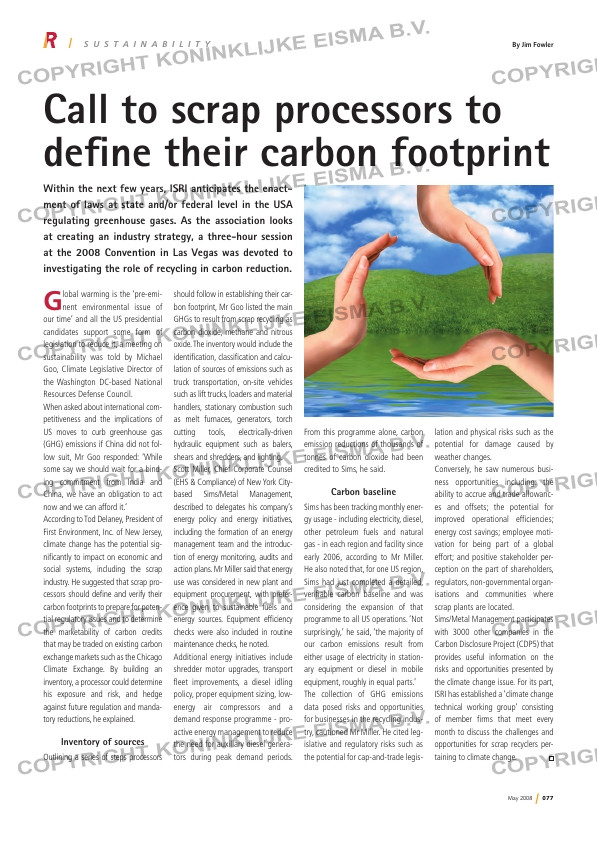Page 77 from: May 2008

May 2008 077
From this programme alone, carbon
emission reductions of thousands of
tonnes of carbon dioxide had been
credited to Sims, he said.
Carbon baseline
Sims has been tracking monthly ener-
gy usage – including electricity, diesel,
other petroleum fuels and natural
gas – in each region and facility since
early 2006, according to Mr Miller.
He also noted that, for one US region,
Sims had just completed a detailed,
verifiable carbon baseline and was
considering the expansion of that
programme to all US operations. ‘Not
surprisingly,’ he said, ‘the majority of
our carbon emissions result from
either usage of electricity in station-
ary equipment or diesel in mobile
equipment, roughly in equal parts.’
The collection of GHG emissions
data posed risks and opportunities
for businesses in the recycling indus-
try, cautioned Mr Miller. He cited leg-
islative and regulatory risks such as
the potential for cap-and-trade legis-
lation and physical risks such as the
potential for damage caused by
weather changes.
Conversely, he saw numerous busi-
ness opportunities including: the
ability to accrue and trade allowanc-
es and offsets; the potential for
improved operational efficiencies;
energy cost savings; employee moti-
vation for being part of a global
effort; and positive stakeholder per-
ception on the part of shareholders,
regulators, non-governmental organ-
isations and communities where
scrap plants are located.
Sims/Metal Management participates
with 3000 other companies in the
Carbon Disclosure Project (CDP5) that
provides useful information on the
risks and opportunities presented by
the climate change issue. For its part,
ISRI has established a ‘climate change
technical working group’ consisting
of member firms that meet every
month to discuss the challenges and
opportunities for scrap recyclers per-
taining to climate change.
Global warming is the ‘pre-emi-nent environmental issue of
our time’ and all the US presidential
candidates support some form of
legislation to reduce it, a meeting on
sustainability was told by Michael
Goo, Climate Legislative Director of
the Washington DC-based National
Resources Defense Council.
When asked about international com-
petitiveness and the implications of
US moves to curb greenhouse gas
(GHG) emissions if China did not fol-
low suit, Mr Goo responded: ‘While
some say we should wait for a bind-
ing commitment from India and
China, we have an obligation to act
now and we can afford it.’
According to Tod Delaney, President of
First Environment, Inc. of New Jersey,
climate change has the potential sig-
nificantly to impact on economic and
social systems, including the scrap
industry. He suggested that scrap pro-
cessors should define and verify their
carbon footprints to prepare for poten-
tial regulatory issues and to determine
the marketability of carbon credits
that may be traded on existing carbon
exchange markets such as the Chicago
Climate Exchange. By building an
inventory, a processor could determine
his exposure and risk, and hedge
against future regulation and manda-
tory reductions, he explained.
Inventory of sources
Outlining a series of steps processors
should follow in establishing their car-
bon footprint, Mr Goo listed the main
GHGs to result from scrap recycling as
carbon dioxide, methane and nitrous
oxide. The inventory would include the
identification, classification and calcu-
lation of sources of emissions such as
truck transportation, on-site vehicles
such as lift trucks, loaders and material
handlers, stationary combustion such
as melt furnaces, generators, torch
cutting tools, electrically-driven
hydraulic equipment such as balers,
shears and shredders, and lighting.
Scott Miller, Chief Corporate Counsel
(EHS & Compliance) of New York City-
based Sims/Metal Management,
described to delegates his company’s
energy policy and energy initiatives,
including the formation of an energy
management team and the introduc-
tion of energy monitoring, audits and
action plans. Mr Miller said that energy
use was considered in new plant and
equipment procurement, with prefer-
ence given to sustainable fuels and
energy sources. Equipment efficiency
checks were also included in routine
maintenance checks, he noted.
Additional energy initiatives include
shredder motor upgrades, transport
fleet improvements, a diesel idling
policy, proper equipment sizing, low-
energy air compressors and a
demand response programme – pro-
active energy management to reduce
the need for auxiliary diesel genera-
tors during peak demand periods.
By Jim Fowler S u S t a i n a b i l i t y
Call to scrap processors to
define their carbon footprint
Within the next few years, ISRI anticipates the enact-
ment of laws at state and/or federal level in the USA
regulating greenhouse gases. As the association looks
at creating an industry strategy, a three-hour session
at the 2008 Convention in Las Vegas was devoted to
investigating the role of recycling in carbon reduction.
RI_037_Sustainability.indd 1 14-05-2008 13:57:45



